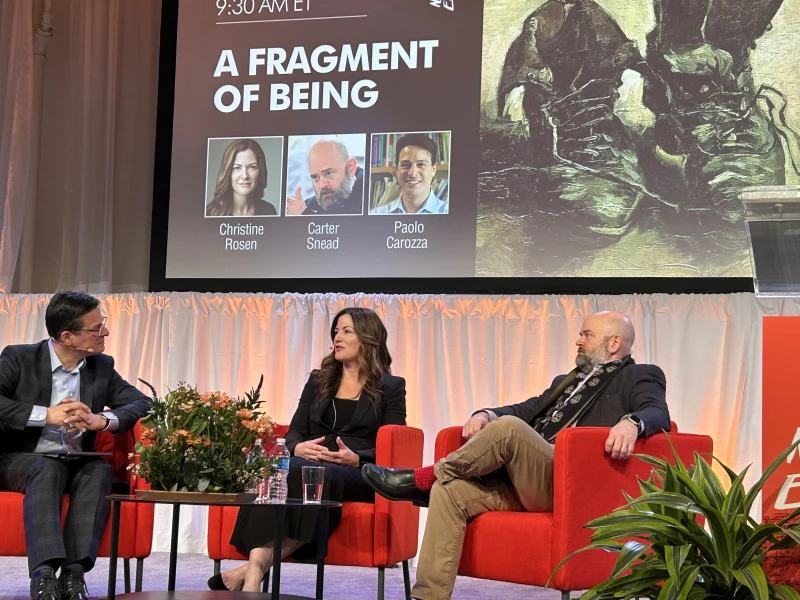New York Encounter: Technology is costing us our humanity, experts say

 Left to right: Paolo Carozza, a law professor at the University of Notre Dame; Christine Rosen, senior fellow at the American Enterprise Institute, and Carter Snead, a Notre Dame law professor and bioethicist, discuss “the corporeal dimension of human identity in an age of virtual reality” at the New York Encounter in New York City on Feb. 15, 2025. / Credit: Zelda Caldwell/CNA
Left to right: Paolo Carozza, a law professor at the University of Notre Dame; Christine Rosen, senior fellow at the American Enterprise Institute, and Carter Snead, a Notre Dame law professor and bioethicist, discuss “the corporeal dimension of human identity in an age of virtual reality” at the New York Encounter in New York City on Feb. 15, 2025. / Credit: Zelda Caldwell/CNA New York City, N.Y., Feb 15, 2025 / 17:16 pm (CNA).
Technology is robbing us of our humanity, turning humans in some respects into “disembodied” minds, Paolo Carozza, professor of law at the University of Notre Dame, warned Saturday during a panel discussion at this year’s New York Encounter.
Such a notion might have sounded like science fiction not so long ago. But this “disembodiment” — or “forgetting the centrality of the human body,” as Carozza put it — defines who we are as a culture today, thanks to technological advances that have made things increasingly and enticingly convenient, he said.
Carozza, serving as moderator, was joined on the panel by Christine Rosen, author of “The Extinction of Experience: Being Human in a Disembodied World,” and Notre Dame law professor and bioethicist O. Carter Snead, author of “What It Means to Be Human: The Case for the Body in Public Bioethics.”
Held at the Metropolitan Pavilion in New York City’s Chelsea neighborhood, New York Encounter is an annual, wide-ranging cultural conference organized by members of the Catholic movement Communion and Liberation. The three-day event, which is free and livestreamed online, concludes Sunday.
In their conversation, Carozza, Rosen, and Snead focused on the extent to which human experience has become an increasingly isolated affair.
“I’d rather summon a car with a press of a button, never talk to the driver, and be dropped off at my location. I would like to have my food dropped on my doorstep, never having to look in the eye at the people who prepared it or delivered it,“ Rosen said, summing up today’s predilection toward convenience.
In addition, time spent on social media, she said, is more than simply time wasted but changes the way we see ourselves and our relation to others.
“We begin to prefer mediated communication to face-to-face communication. We begin to mistrust our own emotional responses to things unless they’re reflected on a social media page and we get enough likes for them. In that sense, we’re habituating ourselves to a deeply disembodied way of seeking approval, of understanding the world we live in,” she said.
“I think in very mundane ways, our daily experience has deteriorated because of this mindset, which grew not with any nefarious intent, but over time. We have habits of mind that have formed,” Rosen said.
“You step on a subway platform and people are more rude. There seems to be more hostility and anger and impatience,” she said.
Indifference to the vulnerable
Society’s most vulnerable, including the elderly and children, bear the brunt of this disembodied habit of being, Rosen observed.
She cited the example of a “telepresence” robot delivering a fatal cancer diagnosis to a patient in a hospital and a Japanese nursing home that provides its residents with robotic animals to simulate the comfort of the human touch.
That preference for convenience and avoidance of face-to-face encounters impedes human flourishing, according to Snead.
“The virtues that you need to flourish as an embodied human being embedded in networks of giving and receiving are missed as well. If you think of life as a consumer, you’re not thinking about the virtues of uncalculated giving, just generosity, hospitality, misericordia, which is accompanying others in their suffering as if it’s your own suffering,” he said.
The consequences of this selfishness result in the instrumentalization of others, with fatal consequences, Snead said. He pointed to advances in reproductive technology that allow for the selection of embryos based on IQ (and the elimination of those deemed insufficiently intelligent), as well as assisted suicide legislation that has a bias in favor of encouraging elderly patients to end their lives rather than treating their psychiatric disorders.
Snead said the parents of these embryos can’t be blamed for being blind to the immorality of such technology as certain expectations have arisen from the culture and its legal system.
The appeal of reproductive technology, he said, is not unlike that of technologies that promise consumers they will take into account their personal preferences.
“If you’re thinking about everything in your life as a drop-down menu to order the thing exactly as you want it,” he said, “then you’re irritated when you get something that you didn’t ask for and DoorDash brings you the wrong thing or doesn’t bring the sauce with your burrito or whatever.”
Live in the world you want
All is not lost, however, according to Rosen and Snead. There is hope that we can retrieve what has been lost, but it means rejecting some of the technological conveniences we have come to expect.
“I think we have to just have to have more awareness and thoughtfulness about the world we want to live in, not just the one that we happen to be living in now,” Rosen said.
“At the individual level, you always choose the human. Choose the face-to-face. Embrace the idea that this will be inconvenient and annoying,” she said. “And you have to put on clothes and pants and get out of the house, and wish [people] ‘happy birthday’ to their face, not just because Facebook reminded you it was their birthday.”
Snead suggested we take to heart the words of St. Teresa of Calcutta.
“She said that the reason that we have so much trouble in the world is because we’ve forgotten that we belong to one another. The idea of belonging to one another, even people, it takes some moral imagination to understand how you belong to people that you don’t know, or that you see lying on the street, or that you see in a wheelchair, or someone that doesn’t look like you,” he said.
“It seems to me that for our part, [the way] to recover the genuine vision of friendship and embodied love and friendship and hospitality is through the practice of it,” Snead said. “It’s in your interpersonal relationships. Talk to somebody, interact with somebody, give somebody a hug — with their permission.”
He added: “When we debate and deliberate over regulatory frameworks or statutes or whatever, we should be mindful of the reality of what a human being is and what human flourishing is.”






